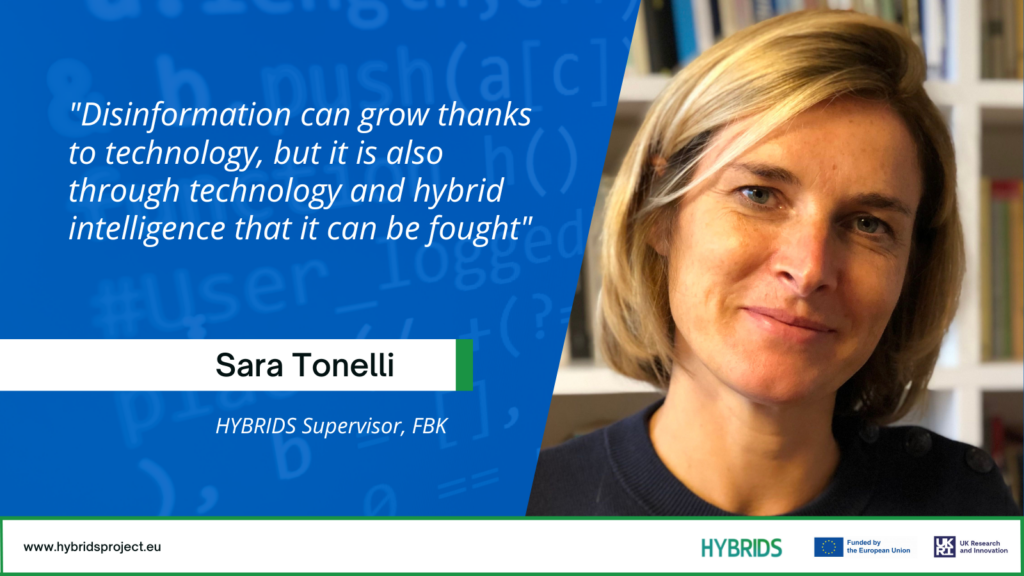By Maria Campins, Newtral
Sara Tonelli is the head of the Digital Humanities research group at the R&D center Fondazione Bruno Kessler (Italy) and a member of HYBRIDS. Throughout this initiative, the acronym of Hybrid Intelligence to monitor, promote and analyse transformations in good democracy practices, 14 institutions will collaborate in the following years to promote different approaches on the basis of an exhaustive analysis of public discourse about crucial global issues, such as health, climate crisis, European skepticism or immigration, which will take into account both traditional media and content published through social networks.
Throughout HYBRIDS, Sara Tonelli is going to supervise an analysis of the role of disinformation to automatically identify hate speech against immigrants in multilingual social environments. Furthermore, she will manage a project to identify the stance of argumentative opinions in the political discourse.
Tonelli has a Ph.D. in Language Sciences and has the national habilitation as an Associate Professor in the area of Information Systems. Tonelli is also a member of ELLIS, the European Laboratory for Learning and Intelligent Systems, and part of the board of the Italian Association for Computational Linguistics (AILC).
How do language sciences contribute to the development of natural language processing?
If we consider language sciences as the field investigating the nature and function of language, this discipline provides the necessary input to natural language processing technologies. The better we understand how language works, and how the different languages are structured, convey meaning, and are used in context, the better technologies will be developed to process natural language.
Which is your investigation field?
My research field is computational social science with a focus on text analysis methods aimed at addressing societal challenges in the digital world, such as hate speech detection, social network analysis, and cyberbullying detection. I am particularly interested in working cross-lingually, to address the fact that current NLP systems tend to work better in English than in other languages.
What are some of the challenges you face in your research?
Some challenges are shared by all the research community working in AI since this field is evolving at a remarkably fast pace and it requires continuously updating research goals and approaches. Other challenges are posed by the need to combine technological research with rigorous ethical and privacy requirements. AI technologies are currently very powerful and in some cases, they can be adopted in real scenarios, but their large-scale impact may affect minorities, exclude or even harm specific groups. Researchers in AI must be well aware of the impact that their findings can have and take this into account for a possible deployment.
Why is it important to train researchers in the field of hybrid intelligence?
It is crucial because I believe that the advantages of AI can benefit us only if we adopt a human-in-the-loop approach, where technology does not replace human decisions but instead can support them, allowing more informed analyses and speeding up processes. But in order to pursue this goal, researchers involved in the development of such technologies must have an in-depth understanding of how to integrate machine and human intelligence in an effective and fair way.
Which questions do you want to solve through the Ph.D. student assigned?
I will co-supervise two students aimed at analysing public discourse. In the first project, we will address the automatic detection of stance in political discourse, to understand how controversial ideas are debated by politicians, with a focus on matters relevant to EU politics such as migration and Euroscepticism. In the second project, we will address the role of disinformation and its relation to hate speech in multilingual social environments, to develop approaches that can tackle this phenomenon on a large scale.
What do you expect from HYBRIDS?
I expect to be part of a network of researchers where different expertise and perspectives on AI will be exchanged, and where young researchers will develop skills to deeply understand AI technologies from an algorithmic point of view while being able to evaluate the societal impact of their adoption. Disinformation is a phenomenon that can grow thanks to technology and digital means, but it is also through technology and hybrid intelligence that it can be fought. I am confident that HYBRIDS will provide significant contributions in this respect.

